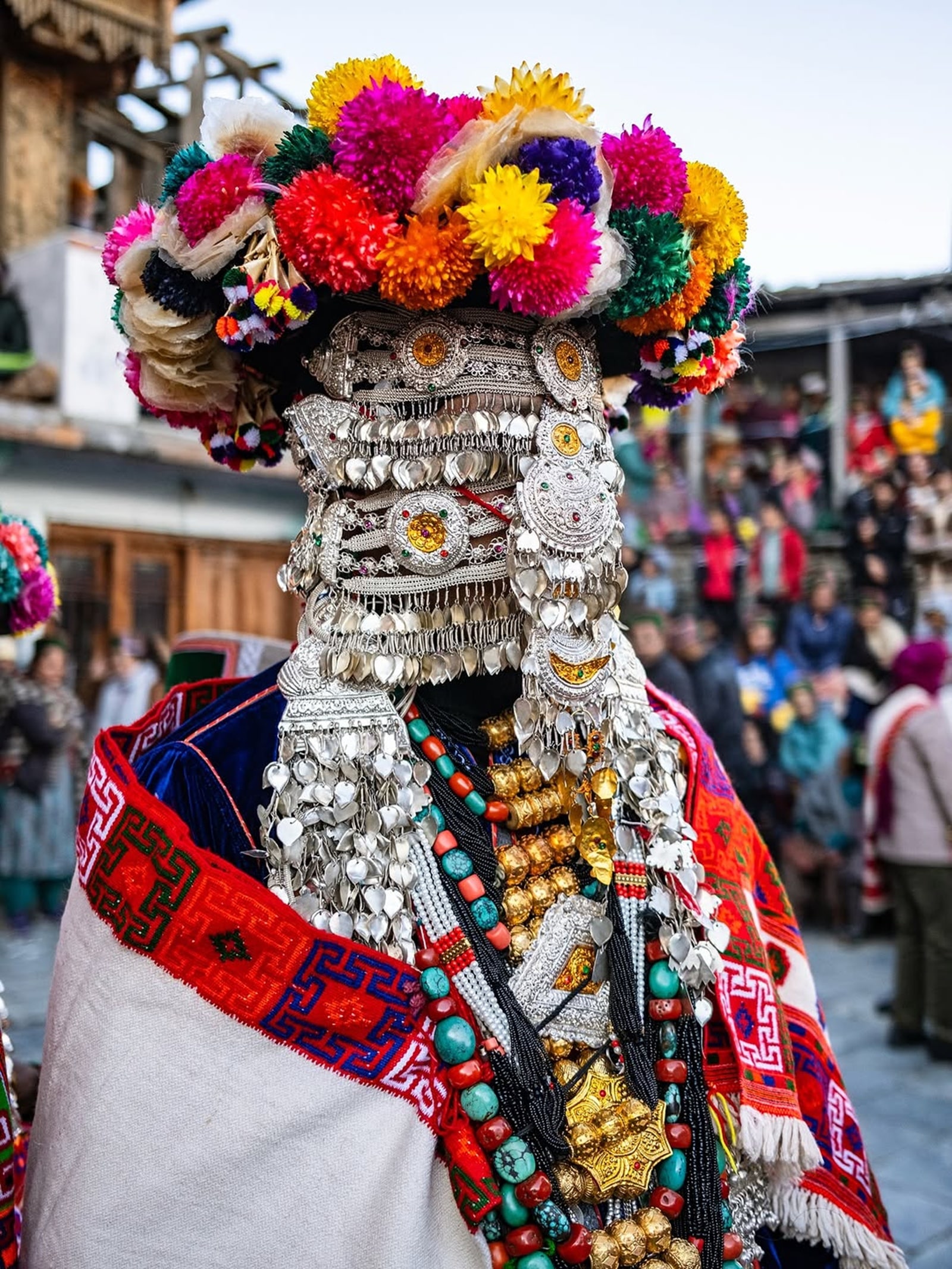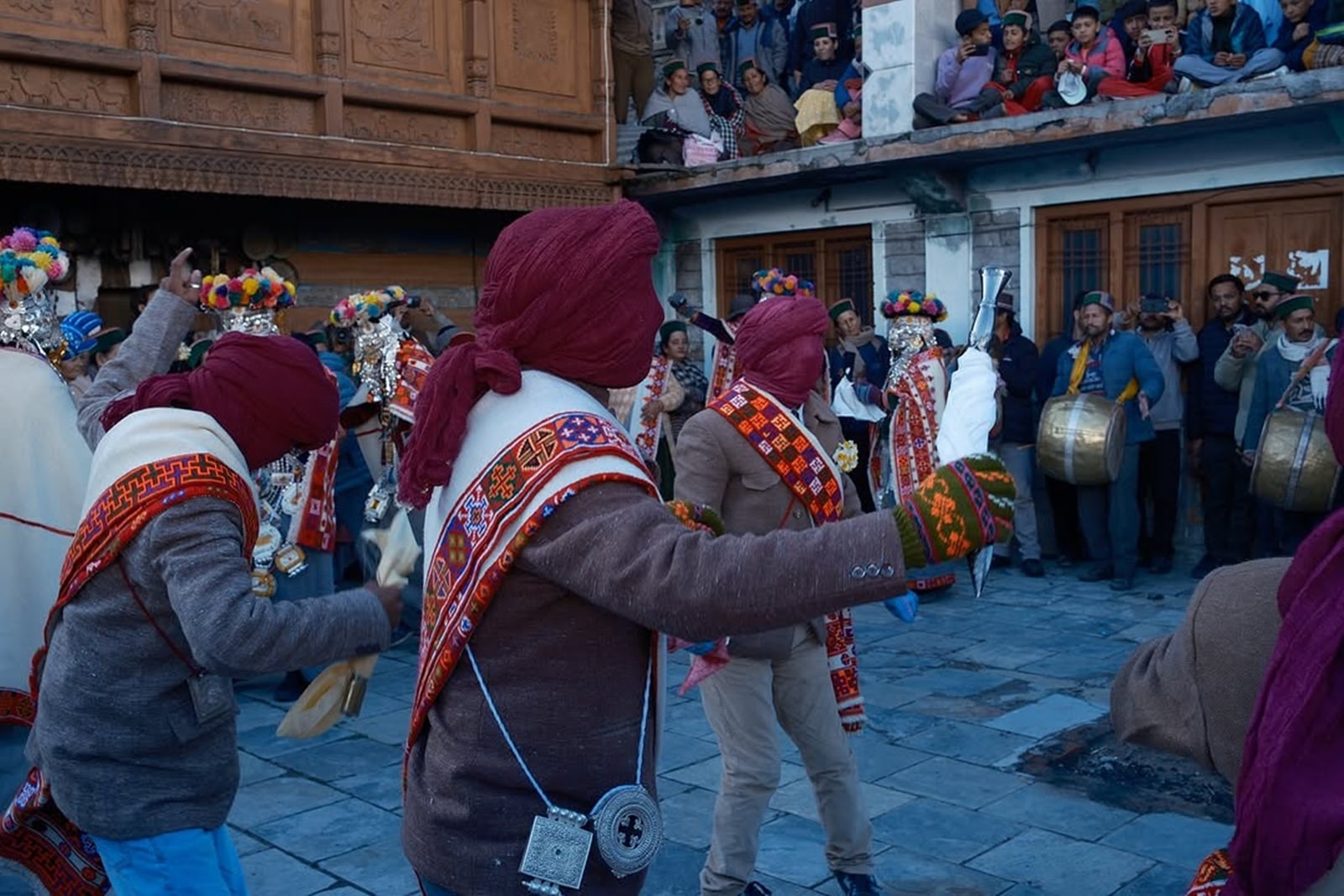Faces covered in silver and gold jewellery, heads adorned with Styrofoam flowers in vibrant hues, and bodies wrapped in traditional handwoven shawls: natives dressed in bridal finery for the Raulane Festival. A mythical celebration to mark the end of winter and welcome the harvest season, villagers residing in the lap of Himachal Pradesh’s Kinnaur valley and surrounding areas come together to dance, sing and indulge in unfettered merrymaking for a few days.

 A close-up shot of the bride (Source: Instagram/@kanwar_photos)
A close-up shot of the bride (Source: Instagram/@kanwar_photos)
In conversation with travel photographer Kanwar Pal Singh, one of the talents behind the original photographs, indianexpress.com learnt all about the traditional Raulane Festival, especially how to pronounce it (Raw-laa-ne)!
About Raulane
Singh shared that Raulane usually occurs on the day after Holi and lasts for 5 days in March. Raulane is native to Kinnaur, a small town in Himachal Pradesh, and tribes from the neighbouring villages of Sangla and Kalpa join in the festivities.
Talking about the festival in detail, Singh, who hails from Himachal’s Chamba region, said, “As much as the locals have told us, in this festival, men dress up like grooms, women as brides and wear all the heirloom jewellery that they have. There is no significance to this festival in their region. It’s just a tribal festival,” he shared, adding, “According to mythology, they send mountain fairies back as soon as the winter ends. It’s a very old, traditional, and generational ritual.”
Singh also mentioned that on the first day, two or three couples will come dressed in finery. The next day, five couples will show up. “The day after, people from neighbouring villages pour in. They dance around and perform a puja,” he added.
Singh shared that it was his first time attending the festival and covering it. “Our experience for this year was very good because it was not very crowded. This is the first PR of this festival that suddenly went viral.”
Story continues below this ad
 Groomsmen dancing at the celebration (Source: Instagram/@kanwar_photos)
Groomsmen dancing at the celebration (Source: Instagram/@kanwar_photos)
Tips to attend the Festival:
Singh shared a couple of important pointers for those intrigued and excited to add Raulane to their travel bucket list:
Mind the cold: It is usually very cold in the hills in March, and last year it snowed the day before the Festival. Carry warm clothes and prepare yourself accordingly.
Travel is not the smoothest: The roads are treacherous, and the town is far. Buses are limited. Opt for a daily Reckong Peo bus or take one from Chandigarh to Reckong Peo. Cabs are also available, but in limited numbers.
Accessibility: The space where the Festival is held is small; hence, check with the locals if they are allowing access to the Festival area. If the crowd increases, locals might stop outsiders from attending.
Story continues below this ad
Having said that, Singh also added that Kinnaur and Kalpa are proper tourist places, with good budget-friendly accommodation options and stunning views. Every year, the destination gets significant footfall. Thus, planning a trip won’t be too difficult. The nearest railway station to Kinnaur is Shimla Railway Station, and the nearest airport is also in Shimla.
For people who wish to visit Kinnaur during Holi and attend Raulane, Singh implored them to respect the locals and their traditions. Don’t get too in their faces, and don’t get too excited about them. “I have been seeing Sangla Holi for the last 5 years, and this year I have seen people drinking beer inside the vicinity of the temple,” he recalled. According to him, if the locals get worried, this festival will be closed to everyone. “Please respect their culture. That’s the most basic thing,” he concluded.
DISCLAIMER: This article is based on information from the public domain and/or the experts we spoke to.



 A close-up shot of the bride (Source: Instagram/@kanwar_photos)
A close-up shot of the bride (Source: Instagram/@kanwar_photos) Groomsmen dancing at the celebration (Source: Instagram/@kanwar_photos)
Groomsmen dancing at the celebration (Source: Instagram/@kanwar_photos)

























